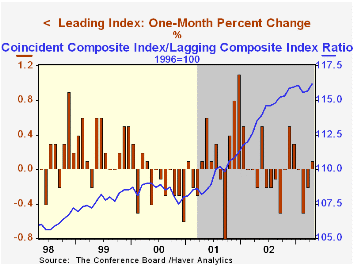 Global| May 19 2003
Global| May 19 2003Leading Indicators Rose Slightly
by:Tom Moeller
|in:Economy in Brief
Summary
The Conference Board reported that the Composite Index of Leading Economic Indicators rose 0.1% last month, as expected. Declines in the prior two months were unrevised. Gains amongst the leaders' component series improved sharply to [...]

The Conference Board reported that the Composite Index of Leading Economic Indicators rose 0.1% last month, as expected. Declines in the prior two months were unrevised.
Gains amongst the leaders' component series improved sharply to 60%, the broadest breadth of one month gain since December of last year. The percentage of leading components rising over a six month period rose slightly to a still quite low 35%.
Improved consumer expectations had the largest positive influence on theApril leading index. Higher stock prices, a higher money supply and a wider yield curve also had significant positive contributions.
The Leading index is based on eight previously reported economic data series and two that are estimated.
The coincident indicators fell slightly and the six month growth rate, which is the latest month's level divided by the average of the prior twelve (AR), was a negligible 0.2%. During the last twenty years there has been an 80% correlation between the quarterly change in the coincident indicators and quarterly growth in real GDP.
The ratio of coincident-to-lagging indicators rose 0.4% to a new high. The ratio is an indicator of excess relative to actual economic performance.
Visit the Conference Board's site for coverage of leading indicator series from around the world.
| Business Cycle Indicators | April | Mar | Y/Y | 2002 | 2001 | 2000 |
|---|---|---|---|---|---|---|
| Leading | 0.1% | -0.2% | -0.2% | 2.1% | -0.9% | 1.0% |
| Coincident | -0.1% | 0.0% | 0.2% | -0.2% | -0.4% | 3.4% |
| Lagging | -0.5% | -0.1% | -2.2% | -4.4% | -1.3% | 2.8% |
Tom Moeller
AuthorMore in Author Profile »Prior to joining Haver Analytics in 2000, Mr. Moeller worked as the Economist at Chancellor Capital Management from 1985 to 1999. There, he developed comprehensive economic forecasts and interpreted economic data for equity and fixed income portfolio managers. Also at Chancellor, Mr. Moeller worked as an equity analyst and was responsible for researching and rating companies in the economically sensitive automobile and housing industries for investment in Chancellor’s equity portfolio. Prior to joining Chancellor, Mr. Moeller was an Economist at Citibank from 1979 to 1984. He also analyzed pricing behavior in the metals industry for the Council on Wage and Price Stability in Washington, D.C. In 1999, Mr. Moeller received the award for most accurate forecast from the Forecasters' Club of New York. From 1990 to 1992 he was President of the New York Association for Business Economists. Mr. Moeller earned an M.B.A. in Finance from Fordham University, where he graduated in 1987. He holds a Bachelor of Arts in Economics from George Washington University.
More Economy in Brief
 Global| Feb 05 2026
Global| Feb 05 2026Charts of the Week: Balanced Policy, Resilient Data and AI Narratives
by:Andrew Cates






